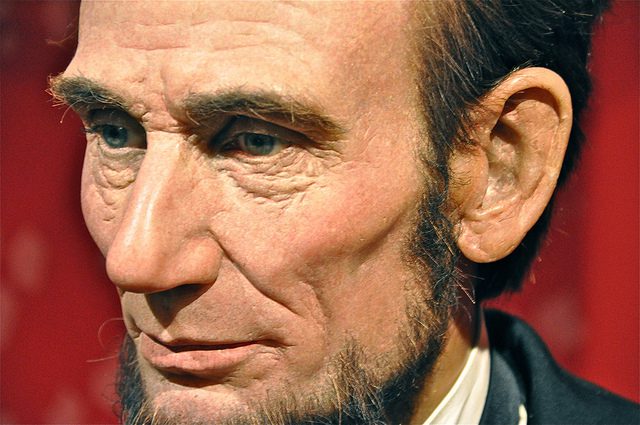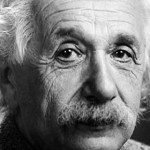
Madame Tussaud’s Abraham Lincoln (photograph by Kevin Burkett: 12-21-12) [Flickr / CC BY-SA 2.0 license]
***
(11-16-06)
*****
[along with fellow so-called atheists Jefferson, Paine, Voltaire, Hume, and Franklin?]
***
Atheist “DagoodS” wrote in one of my comboxes (note: in context, he was speaking rhetorically, but this doesn’t imply that he doesn’t think Twain and Lincoln were atheists):
Imagine I told you that I hold the atheists Abraham Lincoln and Mark Twain in high regard. Now THERE was a fine pair of atheists! . . . When I think of atheism it is the Lincolns and Twains, I see. Not the hordes of also-rans that fail to demonstrate true atheism.
Even the list of notable “‘heroic’ non-believers” that DagoodS directs us to, recognizes distinctions as to belief in God (it notes, for example, that Jefferson was a deist and Paine possibly one, and exercises subtlety and restraint in its very title), but DagoodS shows no such precision of category.
Abraham Lincoln was an atheist? That’s news to me. To the contrary, he is considered by many historians the most religious president ever. Who was he praying to repeatedly during the Civil War? Why is it that he developed his second inaugural address around the notion of divine providence? How can you have a guiding providence if there isn’t anyone there to oversee it?
This sort of historical revisionism (even up to the denial of Jesus’ existence) is one of the more ludicrous elements of atheism. “DagoodS” an intelligent man [an attorney, in fact]. How could he actually fall for the nonsense that Lincoln was an atheist?
I agree that he was by no means an orthodox Christian, nor even any sort of Christian even in a watered-down, insipid liberal Protestant sense, but that is still far different from an atheist (as theists come in many varieties). We must have sensible definition of terms. “Atheist” means no God at all. Even a web page at infidel.org, devoted to the issue, states:
In regard to a Supreme Being he entertained at times Agnostic and even Atheistic opinions. During the later years of his life, however, he professed a sort of Deistic belief, but be did not accept the Christian or anthropomorphic conception of a Deity.
Exactly. This isn’t Christianity, but it isn’t atheism, either. “DagoodS” affirmed that he was an atheist. The same exact silliness is applied to Thomas Jefferson, who was neither an atheist nor a deist (strictly speaking), but rather, a Unitarian (as he referred to himself at least twice in personal letters). Jefferson talked about providence, too, just as Lincoln and also Franklin did. Lincoln is quoted on the same web page:
If God be a just God, all will be saved or none (Manford’s Magazine).
Atheist ignorance and overzealousness on these topics never ends. It is said that philosopher David Hume was an atheist. He was not (I wrote a paper about that and even once amazed a former Christian-turned-atheist philosophy professor at the University of Michigan with this “bombshell” information). Hume accepted one form of the teleological (design) argument for God and never once, it is said, denied that God (of some sort: more like a deist God) existed in his personal letters.
Voltaire and Paine are regarded as atheists. They were not, either. They both believed in God in some sense, but criticized organized religion. The same infidel.org web page states:
The clergy parade Lincoln’s recognitions of a Supreme Being as a triumphant refutation of the claim that he was an Infidel. Yet, at the same time, they do not hesitate to denounce as Infidels, Paine and Voltaire, when they know, or ought to know, that two more profound and reverential believers in God never lived and wrote than Paine and Voltaire.
If Infidelity and Atheism were synonymous terms it would be difficult to maintain that Lincoln, during the last years of his life at least, was an Infidel. But Infidelity and Atheism are not synonymous terms. An Atheist is an Infidel, but an Infidel is not necessarily an Atheist.
Here (from a web page documenting Lincoln’s theism) is a proclamation of fasting and prayer by Lincoln, from March 30, 1863. Either he is lying through his teeth or he is no atheist:
It is the duty of nations as well as of men to own their dependence upon the overruling power of God, and to confess their sins and transgressions in humble sorrow, yet with assured hope that genuine repentance will lead to mercy and pardon, and to recognize the sublime truth, announced in Holy Scripture, and proven by all history, that those nations only are blessed whose God is the Lord. And, insomuch [sic] as we know that by His divine law nations, like individuals, are subjected to punishments and chastisement in this world, may we not justly fear that the awful calamity of civil war which now desolates the land may be but a punishment inflicted upon us for our presumptuous sins, to the needful end of our national reformation as a whole people? We have been the recipients of the choicest bounties of Heaven; we have been preserved these many years in peace and prosperity; we have grown in numbers, wealth and power as no other nation has ever grown. But we have forgotten God. We have forgotten the gracious hand which has preserved us in peace and multiplied and enriched and strengthened us, and we have vainly imagined, in the deceitfulness of our hearts, that all these blessings were produced by some superior wisdom and virtue of our own. Intoxicated with unbroken success, we have become too self-sufficient to feel the necessity of redeeming and preserving grace, too proud to pray to the God that made us. It behooves us, then, to humble ourselves before the offended power, to confess our national sins and to pray for clemency and forgiveness.
Was Lincoln also shamelessly lying in his second inaugural address of 4 March, 1865, about a month before he was murdered?:
The Almighty has His own purposes. “Woe unto the world because of offences! for it must needs be that offences come; but woe to that man by whom the offence cometh!” If we shall suppose that American Slavery is one of those offences which, in the providence of “God, must needs come, but which, having continued through His appointed time, He now wills to remove, and that He gives to both North and South, this terrible war, as the woe due to those by whom the offence came, shall we discern therein any departure from those divine attributes which the believers in a Living God always ascribe to Him?
Fondly do we hope, fervently do we pray, that this mighty scourge of war may speedily pass away. Yet, if God wills that it continue until all the wealth piled up by the bondsman’s 250 years of unrequited toil shall be sunk, and until every drop of blood drawn with the lash shall be paid by another draw with the sword, as was said 3000 years ago, so still must it be said, ‘the judgments of the Lord are true and righteous altogether.
With malice toward none; with charity for all; with firmness in the right, as God gives us to see the right, let us strive on to finish the work we are in; to bind up the nation’s wounds; to care for him who shall have borne the battle, and for his widow, and his orphan – to do all which may achieve and cherish a just, and a lasting peace, among ourselves, and with all nations.
The following is a statement Lincoln made to General Dan Sickles, who participated in the battle of Gettysburg:
Well, I will tell you how it was. In the pinch of the campaign up there (at Gettysburg) when everybody seemed panic stricken and nobody could tell what was going to happen, oppressed by the gravity of our affairs, I went to my room one day and locked the door and got down on my knees before Almighty God and prayed to Him mightily for victory at Gettysburg. I told Him that this war was His war, and our cause His cause, but we could not stand another Fredericksburg or Chancellorsville . . . And after that, I don’t know how it was, and I cannot explain it, but soon a sweet comfort crept into my soul. The feeling came that God had taken the whole business into His own hands and that things would go right at Gettysburg and that is why I had no fears about you.
(July 5, 1863)
Perhaps this proves the truth of the statement, “there are no atheists in foxholes”? Did Lincoln cease to be an atheist the day after Gettysburg, pick it up again for nearly two years, till his second inauguration, and then promptly resume his belief in God in time for that classic speech?
He even mentioned the Holy Spirit, for heaven’s sake, in one of his proclamations (a most politically incorrect and non-secularistic, non-atheistic thing to do indeed):
I invite the people of the United states (on Aug 6) . . . to invoke the influence of His Holy Spirit . . . to guide the counsels of the government with wisdom adequate to so great a national emergency, and to visit with tender care and consolation throughout the length and breadth of our land all those who, through the vicissitudes of marches, voyages, battles, and sieges have been brought to suffer in mind, body, or estate, and finally to lead the whole nation through the paths of repentance and submission to the Divine will back to the perfect enjoyment of union and internal peace.
(July 15, 1863)
And there is his proclamation of the holiday of Thanksgiving:
It has seemed to me fit and proper that they (gifts of God) should be solemnly, reverently, and gratefully acknowledged as with one heart and one voice by the whole American people. I do, therefore, invite my fellow-citizens in every part of the United States, and also those who are at sea and those who are sojourning in foreign lands, to set apart and observe the last Thursday of November next as a day of thanksgiving and praise to our beneficent Father who dwelleth in the heavens.
(October 3, 1863)
Obviously, if Lincoln were truly an atheist during his presidency, then he was an inveterate liar. Since atheists who claim him as one of their own want to make out that he was of such high character (and I fully agree), then this doesn’t fit in with that picture. Therefore, we must conclude that if he was a truthful man to an extraordinary degree, this is inconsistent with a picture of him lying repeatedly about belief in God in his public speeches.
Therefore, one can only reasonably, plausibly conclude that he believed in God. He was not merely a deist but a theist (so it seems from the references to providence), albeit in a sub-Christian manner. Neither deism nor theism is compatible with atheism. So he was not an atheist, and atheists zealous for a known, respected figurehead and hero ought to revise their language to recognize this.
No. (Understand that to me, an atheist is someone who simply lacks a god-belief – for whatever reason – and that I go along with Charles Bradlaugh and the rest who would call an infant an atheist, since a-theism means without theism).
Part of the time he sure seemed like an atheist (such as the poem “Contract with Mrs. T. K. Beecher”) but other times he seemed like a theist or at least one who embraced the supernatural.
Then again, some people change, and others waver. The subject of God and the supernatural is no easy deal, and I don’t blame anyone for being unsure. I try not to categorize someone as atheist or theist unless they consistently use the term (or unless I am in direct dialogue with that person).
Ingersoll called himself an agnostic and an infidel, and I’ll buy that. This gives me something to work on. Paine was clearly a Deist, as was Jefferson.
But Twain was Twain, and who can really explain him? I like him because he merely described his opinions; I don’t remember him attaching a label to himself (but I could be wrong).
I’ve certainly not been the same throughout my life. I first called myself an “atheist” in a courtroom in 1988, and the second time I called myself an “atheist” was shortly before I started putting together the predecessor to this magazine. I was, at one time, a Christian; at another time, I lived with the Hare Krishnas; at still another time, I’d have been glad to read your Tarot.
Because I’ve always had a passion for religion and religious beliefs, and because Twain has had such a profound influence upon me during just about every phase of my life, I’d be interested in any studies of his religious views. If you have a book or article, I’d be interested in reading it. If you could dash off a few notes laying out your case or, better yet, showing both sides of Twain, I’d be more than happy to print it . . .
I have read the old American Atheists article that calls him “two-faced” when it comes to his religious views. (It’s around somewhere; I’ll find it and post it eventually, but am reluctant to post or reprint it because of its tone.) But I think this charge is unfair, considering that religious claims elicit such complex reactions in most people – particularly complex and open-minded people such as Twain. Sure he wavered, but I cannot go so far as to describe him as being two-faced about it. Part of my goal here is to encourage compassion when confronted with others’ religious beliefs, and Twain, of all people, cannot be sized up in three or four pages – if he can be sized up at all!
William Phipps, takes a similar perspective, but coming from a Christian standpoint, and arguing positively for some sort of “Christian” Mark Twain, in his semi-humorously-titled article, “Mark Twain, the Calvinist” (Theology Today, Vol. 51, No. 3 – October 1994):
Many people think Mark Twain was among the cultured despisers of religion and that he became increasingly cynical about both God and humans as he grew older. If being a Christian includes believing in the infallibility of the Bible, the immutability of the species, holy wars, and literal hellfire, then Twain was indeed not religious, not a Christian, and not a Calvinist. But on looking further, both at his life and his writings, one can see that Twain was deeply sensitive to the sovereignty of God and the weakness of those made in the divine likeness. While Twain rejected passages of the Bible that he regarded as absurd and morally repulsive, he was ever a feisty Christian. He wrote: “All that is great and good in our particular civilization came straight from the hand of Jesus Christ.”
. . . Calvinism enabled Twain to discern more keenly the two sides of human nature. “Everyone is a moon and has a dark side,” he quipped. 4 The chasm between the ideal and actual provided the incongruity on which much of Twain’s humor was based. His religion also gave him a compulsion to ridicule the human propensity for self-righteousness. Biographer Edward Wagenknecht writes: “Unchristian conduct on the part of professing Christians was always shocking to Mark Twain. . . . He thinks, he jokes in terms of Calvinism . . . (which) had sunk into the very marrow of his bones.” 5
During the four decades that Twain lived in Hartford he regularly attended the Asylum Hill Congregational Church, where Joseph Twichell was the pastor. It was mainly because of his close friendship with Twichell that Twain settled in Connecticut’s capital and built a house near Twichell. 6 Twain called his church the “Church of the Holy Speculators” because many of its members worked for the insurance companies centered in Hartford. Calvinist Twichell found Twain’s creed as a mature writer acceptable: “I believe in God the Almighty. . . . I think the goodness, the justice, and the mercy of God are manifested in His works.”
. . . In the nineteenth century, people on both sides of the Atlantic seemed especially prone to divorce the performance of faith from the profession of faith. Twain described counterfeit worship this way:
He (God) pronounced his work “good.”. . . Daily we pour out freshlets of disapproval, dispraise, censure, passionate resentment, upon a considerable portion of the work-but not with our mouths. No, it is our acts that betray us, not our words. . . . For ages we have taught ourselves to believe that when we bide a disapproving fact, burying it under a mountain of complimentary lies, He is not aware of it, does not notice it, perceives only the compliments, and is deceived. But is it really so? . . . Is it not a daring affront to the Supreme Intelligence to believe such a thing? Does any of us inordinately praise a mother’s whole family to her face, indiscriminately, and in that same movement slap one of her children? Would not that act turn our inflamed eulogy into nonsense? 15
Twain did not regard holiness as an enemy of hilarity, and he even ranked humor as one of God’s chief attributes. 16 Accordingly, as one made in the divine image, Twain said, “I am God’s fool.” 17 He regarded laughter, conveyed by his fictional and non-fictional writings, as the most effective way of dealing with human foibles. While seriously trusting in God, he laughed at lesser commitments to Bible and sect-and the world laughed with him. Finding much pretense and little Christian substance in the character of his New England contemporary, Mary Baker Eddy, he devoted a book to an examination of the founder of Christian Science.
. . . Albert Paine, who lived with Twain while composing his official biography, commented: “Mark Twain’s God was of colossal proportions-so vast, indeed, that the constellated stars were but molecules in His veins.” 19 Witness to this belief is Captain Stormfield’s Visit to Heaven, Twain’s rollicking treatment of the traditional provincial and literal notions of heaven. His God is too grand to be comprehended by the puny cosmic conceptions of earthlings. Twain had this to say about “the authentic Creator of the real universe:” “Let us now consider . . . that God of unthinkable grandeur and majesty, by comparison with whom all the other gods whose myriads infest the feeble imaginations of men are as a swarm of gnats scattered and lost in the infinitudes of the empty sky.” 20
Two of Twain’s three children, as well as his wife, preceded him in death. Those personal tragedies prompted this jotting on divine suffering:
When I think of the suffering which I see around me, and how it wrings my heart; and then remember what a drop in the ocean this is, compared with the measureless Atlantics of misery which God has to see every day, my resentment is roused against those thoughtless people who are so glib to glorify God, yet never to have a word of pity for Him. 21
Although never certified as a cleric, Twain fulfilled his childhood ambition. Near the end of his life, he wrote: “I have always preached. . . . If the humor came of its own accord and uninvited I have allowed it a place in my sermon, but I was not writing the sermon for the sake of the humor.” 22
[see further documentation of citations in the article]
Likewise, David Tomlinson, in a review of a collection of writings by Twain on biblical themes, posits a “pseudo-Calvinist” Mark Twain:
The curious thing is Twain’s attitude toward Biblical literalism. As an adult, he associated with the minister Joseph Twichell and a set of people who would not have viewed Biblical literature as literal truth. They would have seen it as representing the beliefs of those who did the writing of the Biblical books. The imperfections of the God of “Genesis,” then, should not be attributed to God but to those who wrote about him. What the nineteenth-century sophisticates believed was never what Twain himself could take to heart, however. He had been raised in the Biblical literalism of the small Hannibal churches, and no fancy theological explanations would relieve him of the burden that the literalism he learned there imposed.
This sounds to me like no atheist at all. Rather, it sounds exactly like a troubled, irreverent (and irreverently funny) but ultimately “pious” theist no longer “orthodox” in a Protestant or Catholic sense, but profoundly, deeply influenced by Calvinism and Christianity in general. In other words, he is basically in this respect a wise, funny version of Abraham Lincoln. But neither man was an atheist.













